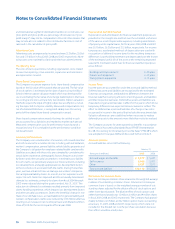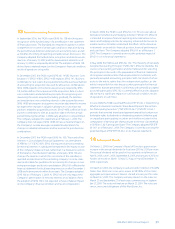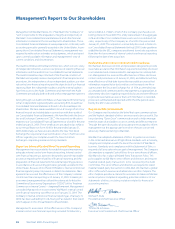Walmart 2009 Annual Report Download - page 48
Download and view the complete annual report
Please find page 48 of the 2009 Walmart annual report below. You can navigate through the pages in the report by either clicking on the pages listed below, or by using the keyword search tool below to find specific information within the annual report.46 Wal-Mart 2009 Annual Report
Notes to Consolidated Financial Statements
Wage-and-Hour Class Actions: The Company is a defendant in
numerous cases containing class-action allegations in which the
plainti s are current and former hourly associates who allege that the
Company forced or encouraged them to work “o the clock,” failed to
provide rest breaks or meal periods, or otherwise failed to pay them
correctly. The complaints generally seek unspeci ed monetary dam-
ages, injunctive relief, or both. Class or collective-action certi cation
has yet to be addressed by the court in a majority of these cases.
In the majority of wage-and-hour class actions filed against the
Company in which the courts have addressed the issue, class certi -
cation has been denied. The Company cannot reasonably estimate
the possible loss or range of loss that may arise from these lawsuits,
except as noted below.
On December 23, 2008, the Company and the attorneys for the
plainti s in 63 of the wage-and-hour class actions described above
announced that they had entered into a series of settlement agree-
ments in connection with those matters. Each of the settlements is
subject to approval by the court in which the matter is pending.
The total amount to be paid by the Company under the settlement
agreements will depend on whether such approvals are granted, as
well as on the number and amount of claims that are submitted by
class members in each matter. If all of the agreements are approved
by the courts, the total to be paid by the Company under the settle-
ment agreements will be at least $352 million, but no more than
$640 million, depending on the number and amount of claims. The
Company may also incur additional administrative expenses and
other costs in the process of concluding the settlements.
One of the remaining wage-and-hour lawsuits is Savaglio v. Wal-Mart
Stores, Inc., a class-action lawsuit in which the plainti s allege that they
were not provided meal and rest breaks in accordance with California
law, and seek monetary damages and injunctive relief. A trial on the
plainti s’ claims for monetary damages concluded on December 22,
2005. The jury returned a verdict of approximately $57 million in stat-
utory penalties and $115 million in punitive damages. In June 2006,
the judge entered an order allowing some, but not all, of the injunc-
tive relief sought by the plainti s. On December 27, 2006, the judge
entered an order awarding the plainti s an additional amount of
approximately $26 million in costs and attorneys’ fees. The Company
believes it has substantial factual and legal defenses to the claims at
issue, and on January 31, 2007, the Company led its Notice of Appeal.
On November 19, 2008, the court of appeals issued an Order staying
further proceedings in the Savaglio appeal pending the decision of
the California Supreme Court in a case involving similar issues, entitled
Brinker v. Superior Court.
In another of the remaining wage-and-hour lawsuits, Braun/Hummel
v. Wal-Mart Stores, Inc., a trial was commenced in September 2006,
in Philadelphia, Pennsylvania. The plaintiffs allege that the Com-
pany failed to pay class members for all hours worked and prevented
class members from taking their full meal and rest breaks. On Octo-
ber 13, 2006, the jury awarded back-pay damages to the plainti s of
approximately $78 million on their claims for o -the-clock work and
missed rest breaks. The jury found in favor of the Company on the
plainti s’ meal-period claims. On November 14, 2007, the trial judge
entered a nal judgment in the approximate amount of $188 million,
which included the jury’s back-pay award plus statutory penalties,
prejudgment interest and attorneys’ fees. The Company believes it
has substantial factual and legal defenses to the claims at issue, and
on December 7, 2007, the Company led its Notice of Appeal.
In another wage-and-hour lawsuit, Braun v. Wal-Mart Stores, Inc., the
Company agreed in October 2008 to settle the case by paying up to
approximately $54 million, part of which is to be paid to the State of
Minnesota and part to the class members and their counsel. On Janu-
ary 14, 2009, the trial court entered an Order granting preliminary
approval of the settlement and directing that notices be mailed to
class members. The exact amount that will be paid by the Company
depends on the number and amount of claims that are submitted by
class members in response to the notices.
Exempt Status Cases: The Company is currently a defendant in three
cases in which the plainti s seek class certi cation of various groups
of salaried managers and challenge their exempt status under state
and federal laws. In one of those cases (Sepulveda v. Wal-Mart Stores,
Inc.), class certi cation was denied by the trial court on May 5, 2006.
On April 25, 2008, a three-judge panel of the United States Court of
Appeals for the Ninth Circuit a rmed the trial court’s ruling in part
and reversed it in part, and remanded the case for further proceed-
ings. On May 16, 2008, the Company led a petition seeking review
of that ruling by a larger panel of the court. On October 10, 2008, the
court entered an Order staying all proceedings in the Sepulveda appeal
pending the nal disposition of the appeal in Dukes v. Wal-Mart Stores,
Inc., discussed below. Class certi cation has not been addressed in
the other cases. The Company cannot reasonably estimate the possi-
ble loss or range of loss that may arise from these lawsuits.
Gender Discrimination Cases: The Company is a defendant in Dukes
v. Wal-Mart Stores, Inc., a class-action lawsuit commenced in June 2001
in the United States District Court for the Northern District of Califor-
nia. The case was brought on behalf of all past and present female
employees in all of the Company’s retail stores and warehouse clubs
in the United States. The complaint alleges that the Company has
engaged in a pattern and practice of discriminating against women in
promotions, pay, training and job assignments. The complaint seeks,
among other things, injunctive relief, front pay, back pay, punitive
damages and attorneys’ fees. On June 21, 2004, the district court
issued an order granting in part and denying in part the plainti s’
motion for class certi cation. The class, which was certi ed by the
district court for purposes of liability, injunctive and declaratory relief,
punitive damages and lost pay, subject to certain exceptions, includes
all women employed at any Wal-Mart domestic retail store at any
time since December 26, 1998, who have been or may be subjected
to the pay and management track promotions policies and practices
challenged by the plainti s.
The Company believes that the district court’s ruling is incorrect.
On August 31, 2004, the United States Court of Appeals for the Ninth
Circuit granted the Company’s petition for discretionary review of the
ruling. On February 6, 2007, a divided three-judge panel of the court
of appeals issued a decision a rming the district court’s certi cation
order. On February 20, 2007, the Company filed a petition asking
that the decision be reconsidered by a larger panel of the court. On
December 11, 2007, the three-judge panel withdrew its opinion of
February 6, 2007, and issued a revised opinion. As a result, the Compa-
ny’s Petition for Rehearing En Banc was denied as moot. The Company
led a new Petition for Rehearing En Banc on January 8, 2008. On
February 13, 2009, the court of appeals issued an Order granting the
























